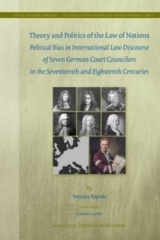Theory and Politics of the Law of Nations
Martinus Nijhoff (Verlag)
978-90-04-20663-2 (ISBN)
Emergence of the modern science of international law in the seventeenth and eighteenth centuries is usually attributed to Hugo Grotius (1583-1645) and other “founders of international law.” Based on the belief that “all seventeenth and eighteenth-century writers of international law had their own particular political context in mind when writing about the law of nations,” this book sheds light on some worldly aspect of the early writers of the law of nations (i.e., the former name for international law). Studied here are the writings of seven German court councilors, namely, Samuel Rachel (Schleswig-Holstein-Gottorp), Gottfried Wilhelm Leibniz (Hannover), Adam Friedrich Glafey (Saxony), Johann Adam Ickstatt (Würzburg-Bamberg), Samuel von Cocceji (Prussia), Johann Jacob Moser (Würtemberg and Hessen-Homburg) and Emer de Vattel (Saxony).
Tetsuya Toyoda is assistant professor at Akita International University. After several years of experience in diplomatic service, he started his research on the history of international law and has produced a number of articles in English, French and Japanese.
Introductory Note
Preface
Chapter One Introduction
1 The ‘Doctrinal History’ of the Science of International Law since Grotius
2 Theorizing about the Law of Nations with Political Interests
3 A Methodological Note
Chapter Two The Pufendorfian Doctrine as the Standard
1 Late Seventeenth-Century Interpretations of the Grotian Concept of the Voluntary Law of Nations
2 Pufendorf’s Opposition to Grotius’s Concept of the Voluntary Law of Nations
3 Pufendorf Against the Law of Nations Regulating Conduct in War
4 Pufendorf Against Grotius’s Support of the Concept of Punitive War
Chapter Three Holsteiner Court Councilor Samuel Rachel’s Criticism of Samuel Pufendorf
1 The Duchy of Holstein and the Life of Samuel Rachel
2 Late Seventeenth-century Proponents of the Voluntary Law of Nations
3 The Exercitationem juridicam and the Danish Occupation
4 Rachel after the Exercitationem juridicam
Chapter Four Hannoverian Court Councilor Gottfried Leibniz and his Concept of International Legal Person
1 The Duchy of Hannover at the End of the Seventeenth Century
2 The Peace Conference of Nijmegen and De Jure Suprematus
3 The Primogeniture and the Concept of Res Juris Gentium
4 Leibniz’s Two Disciples, Wolff and Vattel, Refuting His Concepts
Chapter Five Saxon Court Councilor Glafey Pleading for Rules of Conduct in war
1 The Duchy-Kingdom of Saxony and the Life of Glafey
2 The Görtz-Gyllenborg Affair and Young Glafey’s Disquisitio
3 In Defense of the Concept of the Voluntary Law of Nations
4 War in the Shared Interest of Europe
Chapter Six Catholic Doctrine of the Law of Nations by Johann Adam Ickstatt
1 The Life of Ickstatt and the Political Context of Würzburg-Bamberg
2 The Modernity of Ickstatt’s Doctrine of the Law of Nations
3 The Misfortunes of the First Treatise of International Law
Chapter Seven Prussian Court Councilor Samuel Cocceji’s Denial of the Voluntary Law of Nations
1 The Prussian Kingdom and the Life of Samuel Cocceji
2 Johann Peter von Ludewig’s Support of the Concept of the Voluntary Law of Nations
3 Cocceji’s Attack on Grotius
Chapter Eight Johann Jacob Moser as Defender of Rights of German States
1 Johann Jacob Moser’s Life and its Political Context
2 Moser’s Concept of the Law of Nations and Practical Methodology
3 Moser’s Anti-Prussianism
Chapter Nine Vattel’s Doctrine of National Sovereignty in the Context of Saxony-Poland and Neuchâtel
1 The Principality of Neuchâtel and the Life of Emer de Vattel
2. The Proposal of Transfer of the Principality to the Elector-Prince of Saxony
3 Vattel’s Doctrine of National Sovereignty
4 The Fortunes of Vattel, of Neuchâtel and of Le Droit des Gens
Chapter Ten Conclusion
Bibliography
Index
| Erscheint lt. Verlag | 20.9.2011 |
|---|---|
| Reihe/Serie | Legal History Library / Studies in the History of International Law ; 5/2 |
| Sprache | englisch |
| Maße | 155 x 235 mm |
| Gewicht | 539 g |
| Themenwelt | Geschichte ► Teilgebiete der Geschichte ► Militärgeschichte |
| Recht / Steuern ► EU / Internationales Recht | |
| Recht / Steuern ► Rechtsgeschichte | |
| Sozialwissenschaften | |
| ISBN-10 | 90-04-20663-9 / 9004206639 |
| ISBN-13 | 978-90-04-20663-2 / 9789004206632 |
| Zustand | Neuware |
| Haben Sie eine Frage zum Produkt? |
aus dem Bereich




